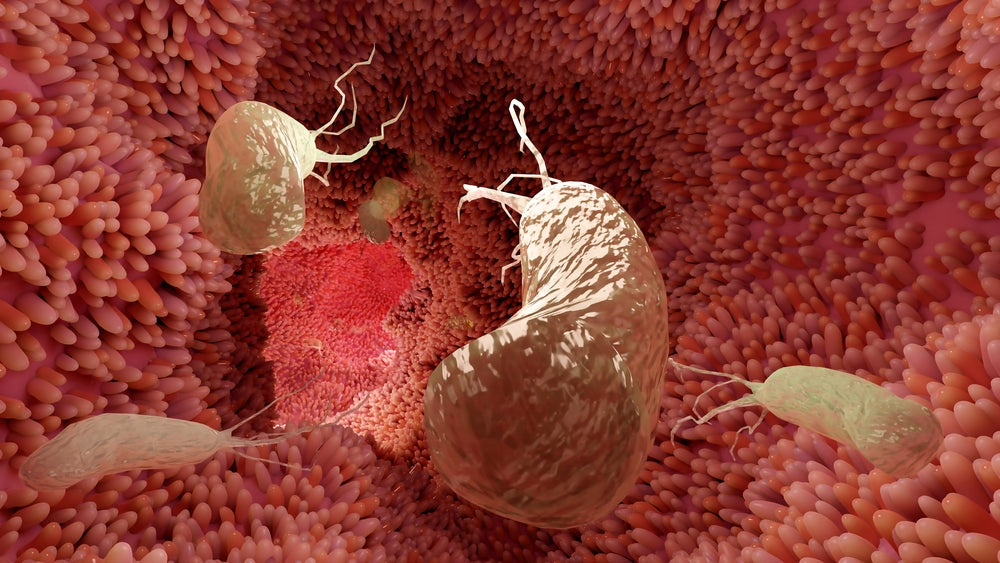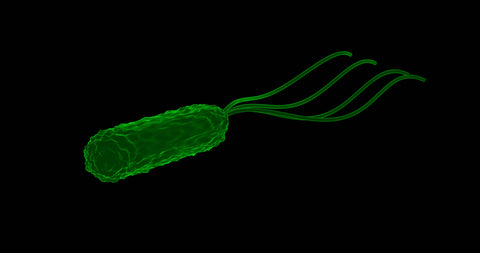H Pylori Symptoms, Signs and Natural Treatment

Share
H. pylori is a type of bacteria that inhabits the digestive tract and can negatively impact your gut. It adapts to the acidic environment in the gut by changing the pH around it, which can cause damage to your stomach lining. H. pylori infections are very common. In fact, studies suggest that nearly 50 percent of people worldwide have an H. pylori infection. Usually these infections are harmless and cause no symptoms, however, they can cause ulcers in the stomach and small intestine. In this article, we are going to discuss H. pylori and its health effects in depth.
What Is H. Pylori?

H. Pylori is a type of bacteria that inhabits the digestive tract. It has adapted itself to live in the acidic environment of the stomach where many other bacteria cannot survive.
The “H” in H. pylori is short for Helicobacter. “Helico” means spiral, referring to the spiral shape of this bacteria, whereas “bacter” is simply short for bacteria. “Pylori” is the plural noun for pylorus, the opening from the stomach into the duodenum (small intestine), where H. Pylori typically resides.
In order to survive, H. Pylori bacteria can reduce the acidity of the environment around it. This can change the acidity of the stomach and can have a negative effect, leading to stomach issues. H. pylori is able to penetrate through the stomach lining, where it is then protected by mucus and unable to be reached by the body’s immune cells.
While infections with this strain of bacteria typically don’t cause symptoms, they can lead to diseases in some people, including peptic ulcers and gastritis, an inflammatory stomach condition.
What Are the Symptoms of H. Pylori Infection?
As mentioned, most people with H. pylori never have symptoms. But the bacteria can damage the inner protective lining of the stomach and can cause other diseases, like gastritis or a peptic ulcer. H. pylori symptoms include:
- burning stomach pain (especially when you have an empty stomach)
- weak appetite
- bloating
- nausea or vomiting
- excess gas
- unexplained weight loss
The symptoms of H. pylori resemble symptoms that can be associated with other diseases. For this reason, it’s important to talk to a doctor if you experience any symptoms of H. pylori or are concerned about an H. pylori infection.
What Causes H. Pylori Infections?
H. pylori bacteria are usually passed from one person to another through direct contact with saliva, vomit or stool. H. pylori may also be spread through contaminated food or water. However, experts still do not understand how H. pylori infections cause ulcers in some people and not others, or why H. pylori infections spread.
Is H. Pylori Contagious?

Yes, the infections are thought to spread from one person’s mouth to another, like by kissing. H. pylori can also spread through contact with contaminated water or food, or through contact with vomit or stool. Washing your hands after using the bathroom and before eating can make a big difference in preventing infection with this bacteria.
Some people may be at more risk of developing an H. pylori infection than others—particularly children. This is largely because children may not always practice proper hygiene, and also because they have underdeveloped immune systems.
Your risk of infection may also be higher if you live in a developing country, share a living space with another person who has contracted H. pylori, lack access to clean water, do not wash your fruits and vegetables, or live in overcrowded conditions.
How Do You Diagnose an H. Pylori Infection?

The start of the diagnosis process involves checking to see if you have symptoms that correlate with H. pylori symptoms, or of any other digestive condition. A doctor may then run several tests to diagnose if your symptoms are caused by H. pylori.
A blood test is one common test that is performed. In this case, your doctor will draw a sample of blood from your arm or hand and send the sample to a laboratory to check for antibodies to H. pylori.
A stool test may also be used. For this test, your doctor, collect a sample of your feces in a small container and send it to a lab for either a stool antigen test or a stool culture test.
A urea breath test may be used to diagnose H. pylori. For this test, you breathe into a collection bag twice. In between providing these breath samples, you consume a pill or liquid with a harmless radioactive material. This test checks for abnormal carbon dioxide levels, which could indicate a possibility of H. pylori infection.
If the results of the above-mentioned tests are inconclusive, then a healthcare professional may recommend getting an endoscopy for further testing. An endoscopy is a nonsurgical procedure used to examine a person's digestive tract. Using an endoscope, a flexible tube is inserted into your mouth and down into your stomach and with a light and camera attached to it. Your doctor can then view pictures of your digestive tract on a color TV monitor, viewing your esophagus, stomach lining, and a portion of your small intestine.
What Are the Biggest Concerns with Having an H. Pylori Infection?
For the majority of people with an H. pylori infection, there are no noticeable symptoms. Others, however, may have complications caused by an H. pylori infection. One of the biggest causes of concern with an H. pylori infection is the development of a peptic ulcer.
A peptic ulcer is a sore on the lining of your stomach, small intestine or esophagus. An infection or ulcer can lead to more serious complications, such as internal bleeding, which can happen when a peptic ulcer breaks through your blood vessel and is associated with iron deficiency anemia.
Obstructions are also a cause for concern with H. pylori infections, which can occur when something blocks food from leaving your stomach. Since H. pylori tend to hang out in the area between your stomach and small intestine, they may potentially cause some blockages for food passing through.
Perforation may also happen, which occurs when an ulcer breaks through your stomach wall. Peritonitis is another possible complication of an H. pylori infection, which is an infection of the lining of the abdominal cavity.
How Do You Treat an H. Pylori Infection?
If you have an H. pylori infection that isn’t causing you issues, treatment may not be necessary. If you have an ulcer, however, your doctor may recommend treating your H. pylori infection. Treatment can cure an ulcer, and it may reduce your risk of developing further complications.
H. pylori treatment usually involves using medication. Often two types of medication are prescribed—antibiotics and proton-pump inhibitors. Antibiotics will kill the bacteria, while a proton-pump inhibitor will reduce your stomach acid. Usually these medications are prescribed to be used for up to 14 days.
Your treatment may also vary depending on your medical history and if you have any allergies to certain types medications. After the treatment, you may need to do a follow-up test for H. pylori. Often one round of treatment is enough, but it is possible that you may need to do multiple rounds to get rid of your infection.
Are There Natural Treatments for H. Pylori?
There are natural treatment options for H. pylori, however, in many cases, studies have shown that most natural treatments reduced the number of bacteria in the stomach but did not permanently eradicate them. Be sure to talk with your doctor before beginning a natural treatment regimen.
Probiotics help maintain the balance between good and bad gut bacteria. According to a 2012 study, taking probiotics before or after standard H. pylori treatment may improve eradication rates. Antibiotics kill both good and bad bacteria in your stomach. Probiotics help replenish good bacteria. They may also reduce your risk of developing yeast overgrowth. Researchers found evidence to suggest that the bacteria Lactobacillus acidophilus delivers the best results.
A 2009 study on mice found that green tea may help kill and slow the growth of H. pylori. The study found that consuming green tea before an infection prevents stomach inflammation, while consuming the tea during an infection reduced the severity of gastritis.
Licorice root is a common natural remedy for stomach ulcers. It may also fight H. pylori. According to a 2009 study, licorice root doesn’t directly kill the bacteria, but it can help prevent it from sticking to cell walls.
What Foods Kill H. pylori?

Some foods may also help to eradicate an H. pylori infection.
One study in 2007 found that olive oil has strong antibacterial abilities against eight H. pylori strains. Three of those strains are antibiotic-resistant. Olive oil also remains stable in gastric acid.
Honey has also shown antibacterial abilities against H. pylori. Researchers suggest that using honey with standard treatments may shorten treatment time, with raw honey and manuka honey having the most antibacterial effects.
Broccoli sprouts may also kill H. pylori. This is due to a compound in broccoli sprouts called sulphoraphane. Research on mice and humans suggests that sulphoraphane reduces gastric inflammation. It also may lower bacteria colonization and its effects.
Learn more about the foods that eliminate H. pylori.
How Can I Prevent an H. Pylori Infection?

Practicing healthy habits and hygiene is the best way to prevent an H. pylori infection. You can lower your risk of infection by:
- washing your hands frequently
- only drinking filtered water
- avoiding food that may be unsanitary or poorly cleaned
What Can I Expect After Treatment of an H. Pylori Infection?
A month after your treatment, your doctor should test to make sure the medication effectively eradicated the bacteria. It is possible that you may need to take more than one round of treatment to kill the H. pylori bacteria.
If you get a peptic ulcer from H. pylori, treating the infection with medication can usually heal a peptic ulcer. Natural remedies like licorice root may also support the healing of the ulcer. If you develop another condition associated with an H. pylori infection, your outlook will depend on the disease, how soon it’s diagnosed, and how it’s treated.
Summary
H. pylori is a type of bacteria that inhabits the digestive tract and can negatively impact your gut. It has adapted itself to live in the acidic environment of the stomach where many other bacteria cannot survive. This can have a harmful effect on the body and lead to stomach issues.
While infections with this strain of bacteria typically don’t cause symptoms, they can lead to diseases in some people, including peptic ulcers and gastritis, an inflammatory stomach condition.
H. pylori symptoms include:
- burning stomach pain (especially when you have an empty stomach)
- weak appetite
- bloating
- nausea or vomiting
- excess gas
- unexplained weight loss
The actual cause of H. pylori infections is unknown. The infections are thought to spread from one person’s mouth to another, like by kissing. H. pylori can also spread through contact with contaminated water or food, and may also be transferred through contact with vomit or stool.
Diagnosis of H. pylori typically occurs through a blood test, stool test, or breath test, or as a last result, an endoscopy.
Treatments of H. pylori typically include a combination of antibiotics, and proton-pump inhibitors. These are recommended to be followed by probiotics to recolonize the gut with good bacteria that may have been killed from the antibiotics. Natural remedies like licorice root may also help to heal ulcers, though an ulcer should also heal once the infection is cleared.
Practicing healthy habits and hygiene is the best way to prevent an H. pylori infection. You can lower your risk of infection by washing your hands frequently, drinking water from a source you know is safe, and avoiding food that hasn’t been cleaned properly or cooked safely.
References:
https://onlinelibrary.wiley.com/doi/10.1111/apt.14561
https://www.ncbi.nlm.nih.gov/pmc/articles/PMC6056709/
https://pubmed.ncbi.nlm.nih.gov/1841451/
https://www.ncbi.nlm.nih.gov/pmc/articles/PMC3501780/